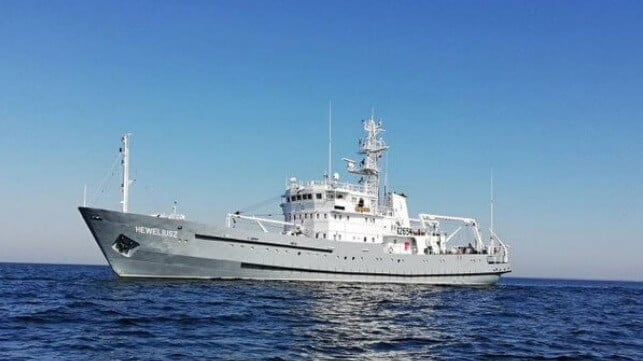Poland Checks Baltic for Explosives as Tensions Continue Over Shadow Fleet

The governments of Poland and Estonia continue to highlight the dangers in the Baltic coming from the shadow fleet and asserting their rights to inspect vessels. This comes as Russian officials have stepped up their verbal attacks on the EU’s efforts to reign in the activity of the so-called shadow fleet of tankers supporting Russia’s oil and gas trade.
After revealing that it had used its military to chase away a tanker acting suspiciously in the Baltic, Poland’s Prime Minister Donald Tusk told reporters on Thursday, May 22, “Not everyone realizes how often critical infrastructure facilities lying on the bottom of the Baltic Sea are the target of sabotage or even terrorist activities.” He was speaking during a follow-up meeting to Tuesday’s incident taking place at the Maritime Operations Center in Gdynia.
Tusk said that the shadow tanker acting suspiciously near the power cable connecting Poland and Sweden was “not the first such situation that we have encountered.” He said he was very satisfied that in a very effective, discreet manner, it was possible to discourage the ship from any actions that could have caused damage to the power cable.
However, he also told reporters, “We are still investigating whether any explosives were planted.” Poland reported that the Navy’s survey vessel ORP Heweliusz had been sent to the area after the incident. Tusk said there were currently no alarming signals but the process was proceeding. He also reported that during the meeting they decided to purchase surveillance drones for the Polish Navy.
At the same time, Estonia’s Prime Minister was questioned by the country’s parliament (Riigikogu) about the incident last week when Estonia attempted to inspect another shadow tanker that it suspected was operating without a valid registration. Prime Minister Kristen Michal cited the mandate given to the Estonian Defense Forces, the Police, and the Border Guard, asserting that “Estonia had legal grounds to inspect the vessel.”
He said the Navy and the other sections of the government would take steps to protect Estonia’s maritime space, including critical infrastructure. ERR news reports he told parliament that “the inspections will continue.”
The Prime Minister said Estonia was ready to board the tanker if it had entered Estonian waters. Instead, the decision had been made to escort the vessel away from Estonian waters. A Russian fighter jet had briefly entered Estonia’s airspace and NATO planes were also observing. Russia however contended at a UN meeting of the Security Council that Estonia was trying to seize the tanker, attempted to board the ship, and tried to ram the tanker when it failed to gain control of the tanker.
Russia’s Permanent Representative to the United Nations Vassily Nebenzia told the Security Council, “This habit of using NATO naval forces and assets for such illegal actions will do nothing but pave the way to military escalation and creation of serious challenges to maritime security.” He called the efforts “pirates of the Baltic Sea.” He also asserted that NATO and West was blocking the investigation to find the terrorists that damaged the Nord 2 pipeline.
Speaking to the media in Moscow on Wednesday, presidential spokesperson Dmitry Peskov said according to Interfax that Russia would use all means available within the framework of international law to defend its ships in the Baltic Sea.

that matters most
Get the latest maritime news delivered to your inbox daily.
"As the latest events related to the attempted pirate attack on one of the tankers have shown, Russia has shown that it is capable of responding quite harshly," Interfax reports Peskov said.
Fueling the tensions are moves by the European Union and the UK expanding the sanctions against shadow fleet tankers. The EU highlighted that it more than doubled the number of sanctioned vessels this week after previously authorizing inspections of documentation and insurance for all ships passing through EU waters even if they were not making a port stop in the EU.
